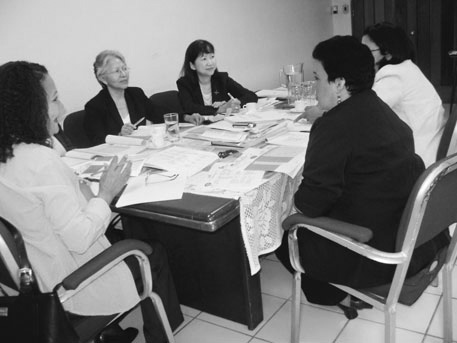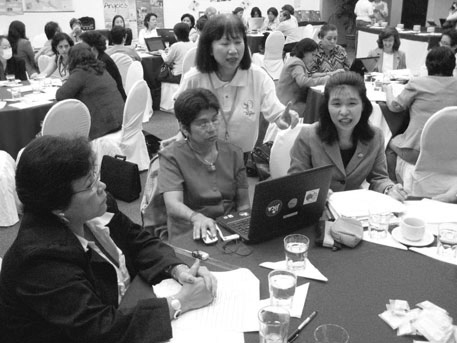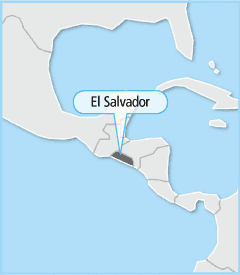Japan's Official Development Assistance White Paper 2010
Column 3 For Improvement of Nursing Standards
—Expanded Cooperation for Nursing Education from El Salvador to Central American and Caribbean Countries—
Located in Central America, El Salvador is the smallest country, about half size of Kyushu, in the Americas. With a population of approximately 6 million people, it is also a highly densely populated country.
Japan, since 1997, has provided assistance for strengthening nursing education in the country (*1). Ms. Masako Ogawa has been involved in this cooperation from its assessment phase as Chief Advisor.
After graduating from nursing school in Japan, Ms. Ogawa gained experience as a nurse and nursing instructor. To further enhance her nursing skills, she intended to study behavioral psychology at university. While she was studying for the entrance exam, she became interested in the Japan Overseas Cooperation Volunteer (JOCV) program, seeing its poster by chance. Her application to the program was accepted, and she was dispatched to a nursing university in Paraguay. After finishing her term, she went to Honduras for a nursing education project as a JICA expert. With these experiences, Ms. Ogawa participated in the project for strengthening nursing education in El Salvador.
When Ms. Ogawa arrived there, the provision of health and medical services was largely delayed, due to the 12-year civil war which continued until 1992. In order to improve this situation, the Government of El Salvador made a request for Japanese assistance, which started as the project for strengthening nursing education in 1997.
At that time, nursing education in El Salvador consisted of day-long group work sessions, using only the limited materials available. For learning nursing skills, students merely observed exercises demonstrated by instructors. Moreover, graduates of nursing departments of universities was to immediately become nurses, or even nursing supervisors and instructors without any practical experience nursing. Seeing this situation, Ms. Ogawa began her activities to strengthen nursing education. Although this project later expanded to other Central American countries, Ms. Ogawa says she did not foresee such expansion, or that it would continue for such a long time. ”The primary reason why the project could continue is the passion of the people of El Salvador with whom I worked. To maintain this passion, it is critical to select a good counterpart.”
Fortunately, Ms. Ogawa had a reliable counterpart named Consuelo for the project, who was with the Nursing Department of Ministry of Health. As the project got underway, steering committees were established and all proceeded concurrently. Ms. Consuelo’s workload increased exponentially, but she said, ”Since Ms. Ogawa, our leader, was so determined, we felt we had to work harder than she did.” Indeed, Ms. Consuelo steadily carried out her work.
Thanks to these efforts, national exam for nurses was established and standardized curriculums were developed. As a result, nursing standards have improved in El Salvador. On her own contributions, Ms. Ogawa says, ”I don’t think I have accomplished everything, but I’ve done my best, giving everything I have. I also have raised many ‘children’ who understand what I want to convey and who try to take it to the next step. In the future, I believe they will make their own style.”
Another project is also underway to disseminate these outcomes to neighboring countries of Guatemala, Nicaragua, Honduras, and the Dominican Republic. This project has increased exchange among these countries. Ms. Ogawa says, ”It is my dream to create ‘Nurses Without Borders’ in which Latin American and Caribbean countries can dispatch nurses to each other in emergency.”
*1 The Project for Strengthening Nursing Education and In-service Training in El Salvador, Guatemala, Honduras, Nicaragua and the Dominican Republic (2007 – 2011), etc.

Giving advice to relevant persons of the Dominican Republic (Second and third from left, Ms. Consuelo and Ms. Ogawa) (Photo: Ms. Ogawa)

Implementers’ meeting among five countries participating in the project (Photo: Ms. Ogawa)

